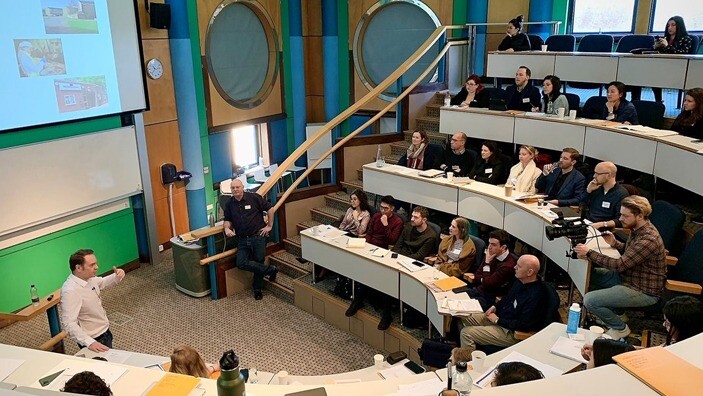Make your mark
Explore – and address – some of the biggest challenges facing us today on our part-time, 2-year Master in Social Innovation.
Covering key social, cultural, economic and environmental issues, you’ll delve deep into theory, gain valuable research tools and explore practical strategies to help you drive social change around the world.
Working both online and face-to-face, you’ll learn from world-leading thinkers and come up with your own social innovation project at the end of it to put your skills into practice.

Modules
Covering 4 modules, you’ll explore social and organisational theory, learn how to lead social change and gain research tools applicable to real-life situations.
- Module 1: Organising for Social Change
- Module 2: Leading Social Innovation
- Module 3: Social Innovation in Practice
- Module 4: Social Innovation Research
- Module 5: Social Innovation Dissertation
Module 1: Organising for Social Change
This module looks at the theory and history of social change, innovation and ventures. You learn and critique ideas from sociology, political science and organisational behaviour in order to build a deep knowledge and understanding of different forms of social and organisational change.
The module covers:
- approaching social change and innovation
- theoretical perspectives of social change and innovation
- theory and practice of social entrepreneurship, intrapreneurship and extrapreneurship
- case studies in social innovation and ventures (corporate, public and social)
Module 2: Leading Social Innovation
This module focuses on strategies for leading and executing social innovation. You examine the distinctive leadership challenges inherent in creating social innovation (as social entrepreneurs and social intrapreneurs within large organisations) and discuss opportunities and challenges of cross-sector collaboration for social change.
The module covers:
- social innovation and organisational theory
- leadership perspectives and practices
- organisational change and collaboration
- developments and challenges in digital innovation
Module 3: Social Innovation in Practice
Module 3 focuses on the knowledge and skills needed to prepare well-thought-out social venture business plans, or project plans around social intrapreneurship or social extrapreneurship interventions. The module is by and large practically focused but brings in the relevant theory to enable students to situate social innovation practice in the wider literature on business planning.
Module 4: Social Innovation Research
You learn and then apply advanced quantitative and qualitative methods in the study of social innovation and ventures in preparation for the dissertation.
The module covers:
- research strategy and processes
- qualitative methods
- quantitative methods
Module 5: Social Innovation Dissertation
You prepare a dissertation (15,000 words) based on primary research in your work or other context agreed with the Programme Director and your dissertation supervisor.
The dissertation mark counts for 50% of the final mark.
Research summaries of dissertations authored by past MSt in Social Innovation students are available from the Cambridge Centre for Social Innovation webpages.
The learning experience
You’ll learn through a mix of online, interactive classes and face-to-face teaching, with 4 one-week residentials in Cambridge.
Across 4 x 2-week blocks, you’ll learn the ins and outs of social innovation and get ready to engage in discussions at the residentials.
- Get up to speed on course content, participate in interactive online classes and carry out self-assessment exercises.
- Get a thorough grounding in the key themes and literature for each module.
- Benefit from a one-to-one tutorial in preparation for the assessment phase.
During the residential weeks, you’ll get to meet fellow students and participate in interactive lectures, workshops, case study sessions and student projects.
- Collaborate on a group project during each residential week, working in small study groups, learning from others around you and exchanging ideas (group projects won’t be assessed).
- Complete a series of individual assignments to put your learning into practice.
- Gain an outside perspective from experienced guest speakers.
- Develop a peer network of likeminded individuals, united by a drive to create social change.
The residential weeks for 2026/28 entrants are scheduled to take place on:
- 30 November – 4 December 2026
- 15-19 March 2027
- 21-25 June 2027
- September 2027 (dates TBC)
Assessment of taught modules will be through a range of formats which may include coursework, written and oral examinations, case studies and presentations.
All core modules carry the same weighting of 12.5% towards your mark, except for the dissertation which contributes to 50% of the final overall grade.
Studying at Cambridge Judge Business School, you’ll meet influential minds across the programme and from the wider University of Cambridge.
- Expand your network through lectures, seminars and workshops – from academics to experienced guest speakers.
- Find opportunities for engagement with the Cambridge Centre for Social Innovation, which supports social innovators and ventures across the city and beyond.
- Gain College membership within the wider University of Cambridge, meeting students shaping the future of politics, business, the creative industries and more.
At the most basic level, it’s given me a lot more confidence in being able to do my work. But also it’s given me a different perspective on how things occur.
Faculty teaching on the programme
You’ll learn from world-leading professors from Cambridge Judge Business School. Their specialties span social ventures, innovation, organisation theory, international business and beyond, combining academic excellence with an informal, personal approach.
Many stay in touch with students after they leave, providing a lifelong connection to thought leaders at the forefront of their industries.








